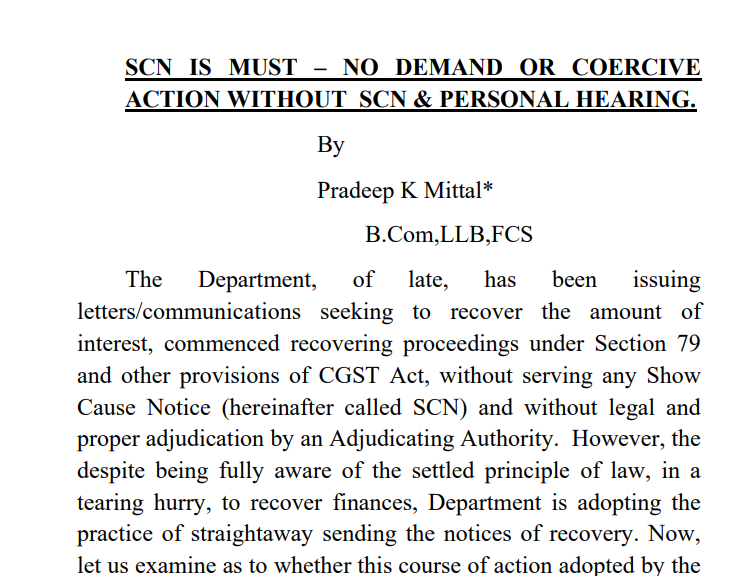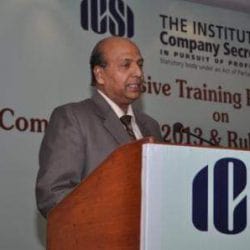SCN Is Must – No Demand Or Coercive Action Without SCN & Personal Hearing.
Table of Contents
SCN IS MUST – NO DEMAND OR COERCIVE ACTION WITHOUT SCN & PERSONAL HEARING.
The Department, of late, has been issuing letters/communications seeking to recover the amount of interest, commenced recovering proceedings under Section 79 and other provisions of CGST Act, without serving any Show Cause Notice (hereinafter called SCN) and without legal and proper adjudication by an Adjudicating Authority. However, despite being fully aware of the settled principle of law, in a tearing hurry, to recover finances, the Department is adopting the practice of straightaway sending the notices of recovery. Now, let us examine as to whether this course of action adopted by the Department meets the tests of law and judicial precedence.
2: The legal mechanism, as provided under Section 73 (for a normal period of limitation) and Section 74 (for an extended period of limitation) of the Goods & Service Tax Act, 2017 (hereinafter called the CGST Act), set the tone for issuance of SCN for seeking to recover (i) tax (ii) penalty (iii) interest (iv) fine or any other sums under different situations.
3: To begin with, the Hon’ble Punjab & Haryana High Court in the case of B.K. Khosla vs. the State of Punjab: MANU/PH/0819/2019 has observed as under:-
It is a settled principle of law that even if an amount has been paid to an employee wrongly or under the mistaken belief, the same can only be recovered after issuance of show cause notice. Even if the rules do not permit so but rules of natural justice stand violated in case the recovery is done without giving any opportunity of hearing.
4: Many a time, the Department takes a view that the amount sought to be recovered is an admitted amount and there is no defense available with the assessee for the same, this judgment of Hon’ble Punjab & Haryana High Court is a clear answer.
5: Likewise, the Supreme Court in S.L. Kapoor v. Jagmohan, MANU/SC/0036/1980 has discarded the contention that it would not have made any difference if natural justice would have been observed. The Court further observed that nonobservance of natural justice is itself prejudice to any man and proof of prejudice is unnecessary.
6: The Supreme Court in Gokak Patel Vokkart Ltd. Vs. CCE MANU/SC/0400/1987 has held that the provisions of Section 11A(1) & (2) (equivalent to Section 73 and 74 of CGST Act) of Central Excises and Salt Act, 1944 make it clear that a notice of show cause has to be issued and the reply to SCN has to be considered by the adjudicating authority and then only, the amount has to be determined/adjudicated under Order-inOriginal.. The scheme is in consonance with the rules of natural justice. An opportunity to be heard is intended to be afforded to the person who is likely to be prejudiced when the order is made before making the order. Notice is thus a condition precedent.
7: The Customs Excise & Service Tax Appellate Tribunal, Bangalore Bench, in the case of Aarms Value Chain Pvt. Ltd. vs. CCE: MANU/CB/0021/2020, have observed as follows:-
Further I find that in the Master Circular No. 1053/02/2017-CX: MANU/EXCR/0002/2017 dated 10/03/2017, the Board has clarified that in case where duty and interest is demanded, it is quite clear that limitation prescribed in Section 11A applies. Further it may be noted that in cases where duty has been paid belatedly and interest has not been paid, interest needs to be demanded and recovered following the due process of demand and adjudication.
Related Topic:
Delay In Adjudication of SCN
6: Therefore, Tribunal, placing reliance on the above Circular, has held that Show Cause Notice is necessary for claiming the amount of interest. The Supreme Court in JK Lakshmi Cements Ltd Vs. CTO MANU/SC/1011/2016 and also in Rantan Melting and Wire Ind Vs. CCE MANU/SC/4587/2008 has held that circulars are instructions are binding upon the Department.
7: Master Circular on Show Cause Notice, Adjudication and Recovery-reg – 10.03.2017 – Ministry of Finance: MANU/EXCR/0002/2017, inter-alia, reads as under:-
Waiver of SCN: The issue of waiver of SCN has been dealt with in circular issued vide F. No. 137/46/2015-Service tax dated 18.08.2015. The crux of the clarification given is that on receipt of written request of the assessee, the requirement of written SCN may be waived and the charges along with duty payable may be explained orally. This clarification was given in the context of closure of cases on payment of duty, interest and penalty. However, where the issue is likely to be litigated at a later date by the assessee, it would be appropriate that a written SCN be issued. This would hold true in particular for offences of serious nature or where the duty involved in high. Conclusion of proceedings may be approved by an officer equal in rank to the officer who is competent to adjudicate such cases.
8: The Supreme Court in a landmark judgment of M S Gill. Vs. CEC MANU/SC/0209/1977 has observed as under:-
In order to impose procedural safeguards, this Court has read the requirement of natural justice in many situations when the statute is silent on this point. The approach of this Court in this regard is that omission to impose the hearing requirement in the statute under which the impugned action is being taken does not exclude hearing – it may be implied from the nature of the power – particularly when the right of a party is affected adversely. The justification for reading such a requirement is that the Court merely supplies omission of the legislature.
PERSONAL HEARING IS A MUST
9: The Madras High Court in LG Electronics India Pvt. Ltd. Vs. CCE,: MANU/TN/0694/2020, where petitioner was issued with the two deficiencies memos pertaining to case of refund of Customs Duty. The petitioner gave its reply and requested for processing of refund claim for refund of Custom Duty. The respondent scrutinized the refund claims and on noticing the discrepancies pointed out in the respective deficiencies memos were not removed, the respondent rejected the respective refund claims vide respective orders impugned herein. The order was passed in violation of principle of natural justice. The court observed that there is violation of principle of natural justice though the petitioner failed to remove the deficiencies pointed out in the respective memos. The Court gave opportunity to file reply to SCN and thereafter personal hearing to the assessee.
10: The Madras High Court in Sanmina-SCI India Pvt. Ltd. Vs. STO: MANU/TN/9356/2019, where pursuant to the VAT Audit Inspection, AO issued notice and petitioner filed replies. The AO passed the assessment orders without giving an opportunity of personal hearing. AO has also chosen to impose penalty under Section 27(3) of the Tamil Nadu Value Added Tax, Act, 2006. The High Court held that the order imposing penalty is bad in law as the same being in violation of principal of natural justice.
11: The Division Bench of Bombay High Court in My Country Mobile Pvt. Ltd. vs. UOI: MANU/MH/3515/2019, while dealing with a case where impugned order dated 29th June 2018 has disposed off two show cause notices dated 9th June 2017 and 9th April 2018 by holding that the Petitioner is liable to pay service tax on Reverse Charge Mechanism on import of services. The Commissioner admittedly given no personal hearing to the Petitioner before he has confirmed the demand sought to be raised under show cause notice dated 9th April. 2018. The High Court quashed the demand and gave a liberty to file an appeal before CESTAT and observed that CESTAT shall decide the appeal on merits without raising an issue of limitation.
12: The Supreme Court of India in Chamoli District CoOperative Bank Ltd. Vs. Raghunath Singh Rana MANU/SC/0627/2016 has held that even where there are no specific statutory rules regarding the observations of rules of natural justice, still due hearing is to be given to an employee/person, in case order causes prejudice to him/her.
13: The Madras High Court in V N Mehta & Co Vs. CCE 2019(112) Taxman.com 376 has held that proceedings under Section 79 of the CGST Act for attachment of bank account on the premise that the authorized signatory made a statement that the amount is payable, cannot be issued without issuance of SCN as the words “amounts payable by the party” would mean that the amount payable by the party after adjudication. Further more no proceedings under Section 62,63,64, 73 and 74 were also pending against the party and hence order of attachment of bank account was quashed by the High Court.
Download the copy:

 Advocate Pradeep Kumar
Advocate Pradeep Kumar
PK Mittal BCom Delhi university 1975 LLB Delhi University 1978 FCS Fellow Member of ICSI 1992 1982 to 1992 as CS in Corporate Head Legal Apollo Tyres Ltd 1986 to 1992 1993 onwards Advocate in Delhi High Court CESTAT NCLT = Practcising Indirect Tax and Corporate laws 1993 to till date. Written more than 100 Article on Company Law and Corporate laws Indirect Tax Speaker on Indirect Tax Co Law and IBC in various Seminars Workshop organised by ICAI ICSI and ICMA and other organisations Convenor Core Group on GST of ICSI







